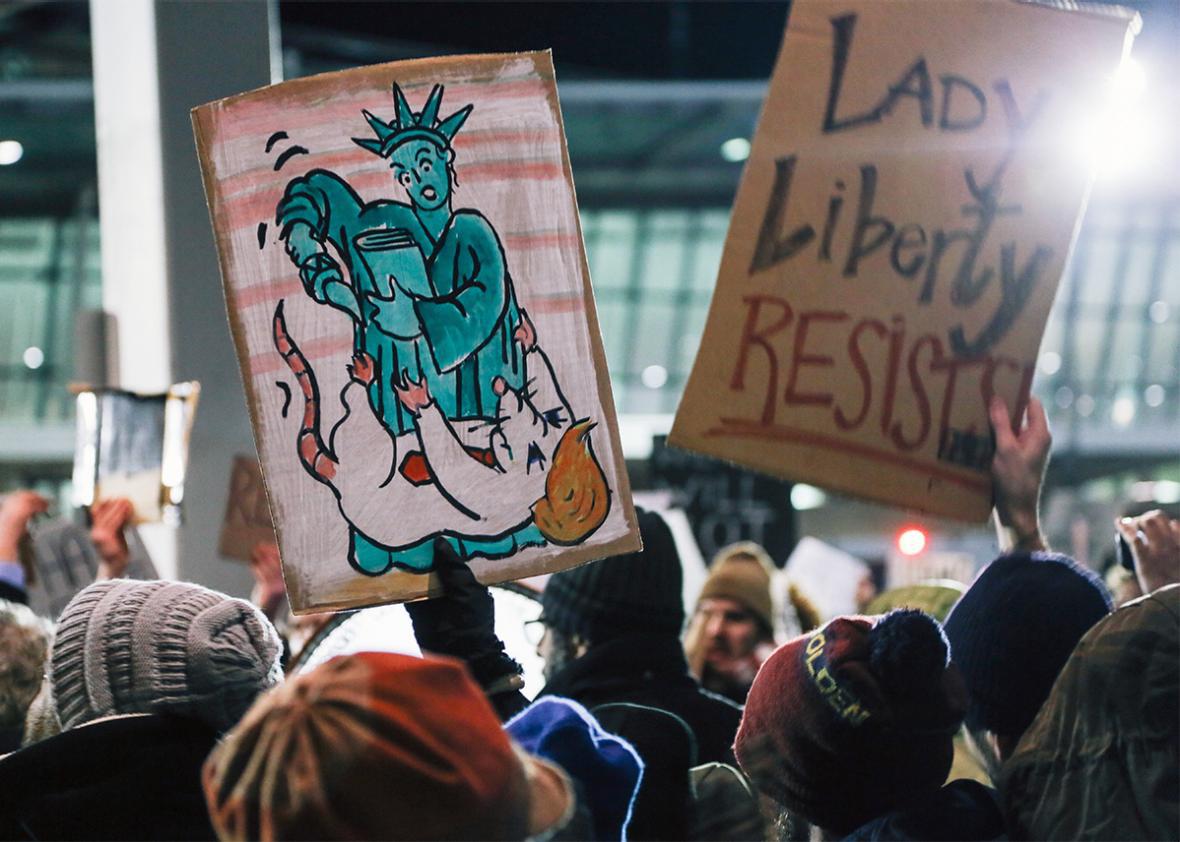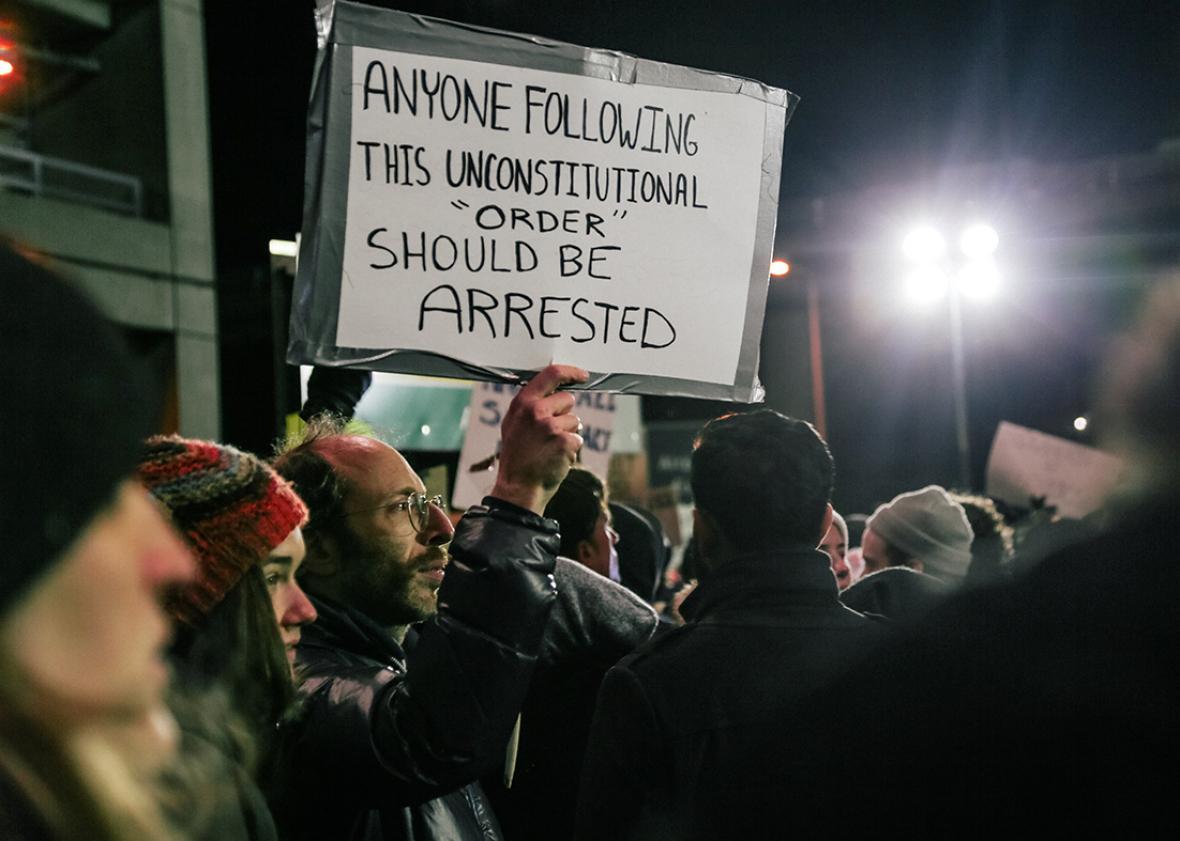In the days after Donald Trump signed his executive order on immigration, it became clear that Customs and Border Protection officers were not all complying with court decisions limiting the order’s application. How lawless were the actions of these CBP officers? A new complaint, compiled by the Center for Constitutional Rights and the Kathryn O. Greenberg Immigration Justice Clinic at Cardozo School of Law, provides a disturbing answer.
The complaint, which was sent to the inspector general of the Department of Homeland Security, contains 26 declarations and affidavits from immigrants and the attorneys who tried to represent them. Their stories range from disconcerting to shocking. According to these testimonials, CBP officers violated immigrants’ rights, contravened multiple court orders, and acted with reckless disregard to the law. The declarations and affidavits allege that elderly immigrants were denied access to food, that lawful immigrants were forced to sign forms they didn’t understand, and that infants were held for no reason. Multiple people were allegedly deported after judges had forbidden such deportations, and others were allegedly denied access to counsel after judges had required that such access be granted.
Here are summaries of some of the most striking allegations from these declarations and affidavits. You can read the entire complaint here.
- Suha Amin Abdullah Abushamma, a Sudanese doctor who was returning from a brief trip to Saudi Arabia to visit her family, says she was detained at John F. Kennedy International Airport for more than 10 hours. Upon her arrival at JFK, Abushamma said, “CBP agents confiscated my passport and threatened to take away my phone. I was not told why my passport was being held and I received no information about how long I would be detained.” She says she “[was] never permitted to speak on the phone with my lawyers while in CBP custody despite my initial and subsequent requests to do so. … [CBP] Agent Lam told me that the only way I was going to leave detention was if I signed a form to return to Saudi Arabia—the country I had flown in from. He showed me a document and told me that I should sign it. I was not allowed to call my lawyer or ask questions about what was in the document.”
“I again told Agent Lam and his supervisor that there were attorneys who were working on my behalf,” Abushamma continued. “I repeatedly begged Agent Lam and his supervisor to give me more time. Agent Lam’s supervisor then told me that an order that would allow me to stay in the United States would need to come from the Supreme Court, and that this would not happen. They told me that my lawyers could not do anything to help me in my situation and so I should just sign the form.”
According to Abushamma, the CBP agent also said that “if I did not sign the form right away, it would mean that I had chosen to be forcibly removed from the United States, and that I would be forced onto the plane anyway, but would then be banned from the United States for five years. … I was so scared. Without being allowed to speak to my attorney on the phone despite my repeated requests, and because of all the negative consequences that Agent Lam had told me would occur if I did not sign the form, and feeling like I had no choice, I signed the form.”
Abushamma says she was given food, and permission to call her family, only after she signed the form. She was subsequently deported to Saudi Arabia.

Lisa Larson-Walker
- An Iranian citizen with a family-based immigrant visa, whose son is a U.S. citizen, says he was detained at Los Angeles International Airport for 18 hours. According to his niece, he was not given food or a place to sleep during this entire period. He was asked to sign a document written in English—a language he does not understand—and told that the document said he was leaving the United States voluntarily. He refused to sign it but was then told he had to. He also refused to get on a plane to Dubai; U.S. officials had to physically carry him on. He is now terrified of being returned to Iran for fear of government retaliation.
- After a federal judge ordered CBP to let detainees at Washington Dulles International Airport speak to lawyers, attorney Ofelia Lee Calderón attempted to speak to two lawful permanent resident clients who were stranded at the airport. She says that a CBP agent told her there was no right to counsel in the airport and asked Calderón to leave. When she returned later, another officer refused to give her any information about her clients. She eventually learned that her clients had been detained and handcuffed by CBP, forced to sign forms relinquishing their lawful permanent resident status, and sent to Ethiopia. At no point were they allowed access to counsel.
- At Dallas/Fort Worth International Airport, CBP officers reportedly detained an elderly Sudanese woman suffering from diabetes, high blood pressure, and severe kidney stones. They refused to provide her attorney or her family with any information on her health, status, or whereabouts. Her attorney later learned that CBP officers had demanded that his client sign a form withdrawing her request for admission into the United States—or be barred from entering the country for five years. She signed the form.
- Also at DFW, CBP agents allegedly detained a lawful permanent resident along with her 11-month-old daughter, a U.S. citizen. They refused to let attorneys speak with the mother. When the child’s father came to the CBP office, agents refused to let him see his daughter.
- CBP officers at Los Angeles International Airport allegedly deported an Iranian student 90 minutes after a federal judge explicitly barred the deportation of anyone targeted by Trump’s order. They ignored efforts by attorneys to halt the deportation.
- CBP officers at San Francisco International Airport allegedly detained an elderly Iranian couple with valid visitor visas for 30 hours. Nineteen of those hours came after a federal judge halted deportations under Trump’s order. One officer informed the couple’s attorney that they might soon be deported. When the attorney explained that this action would violate a federal court order, the officer responded that he was “just following orders.”
- An elderly Iranian couple—both of whom were lawful permanent residents—say they were detained for 10 hours at Chicago’s O’Hare International Airport after returning from their son’s wedding in Iran. The two were denied access to food for the length of their detention. Another elderly person being detained along with the couple was shaking from hunger and nearly passed out. CBP officers refused to inform the couple’s immediate family whether the couple had been allowed to take necessary medications.
- At Dulles, attorneys say they repeatedly approached CBP officers with a paper copy of the federal court order requiring that they be allowed to speak to their detained clients. Officers continued to refuse access “on CBP orders.”
The complaint contains 17 other stories of abuse at the hands of CBP agents. Some of the actions described in these declarations and affidavits are legally questionable; others are plainly unlawful. The complaint requests that CBP “end its policy of preventing individuals detained in airports from accessing counsel.” That would be an excellent start. But it is equally important that the courts make CBP officers aware that, no matter how much power the president purports to give them, they have no authority to defy the commands of the courts.
